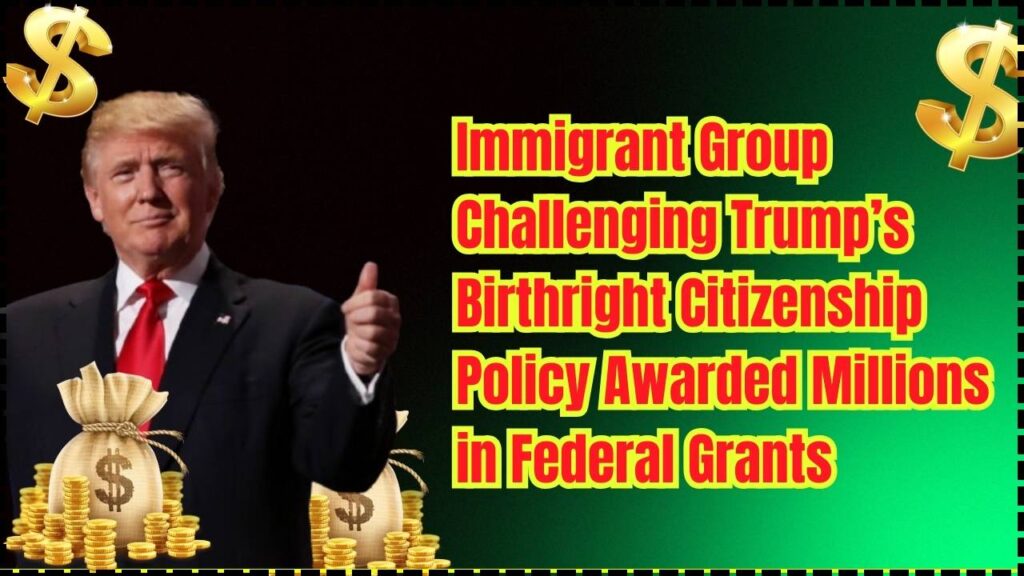
Immigrant Group Challenging Trump’s Birthright Citizenship Policy Awarded Millions in Federal Grants: In a significant legal development, multiple federal judges have blocked President Donald Trump’s executive order aimed at ending birthright citizenship for children born in the United States to non-citizen parents. These rulings underscore the ongoing constitutional debates surrounding the 14th Amendment and highlight the judiciary’s role in checking executive actions.
Immigrant Group Challenging Trump’s Birthright Citizenship Policy Awarded Millions in Federal Grants
The legal challenges against President Trump’s executive order to end birthright citizenship underscore the complex interplay between executive authority and constitutional protections. As the judiciary continues to assess the order’s legality, the nation watches closely, recognizing the profound implications for the American identity and the rights of individuals born on U.S. soil.
| Aspect | Details |
|---|---|
| Executive Order | President Trump’s executive order seeks to end birthright citizenship for children born in the U.S. to non-citizen parents. |
| Legal Challenges | Multiple lawsuits have been filed against the order, with federal judges issuing injunctions blocking its implementation. |
| Constitutional Debate | The core of the legal dispute centers on the interpretation of the 14th Amendment’s Citizenship Clause. |
For more detailed information, visit the American Immigration Council’s official website.
Understanding the Immigrant Group Challenging Trump’s Birthright Citizenship Policy Awarded Millions in Federal Grants
On January 20, 2025, President Donald Trump signed Executive Order 14160, titled “Protecting the Meaning and Value of American Citizenship.” This order seeks to end birthright citizenship for children born in the United States to non-citizen parents, including those who are undocumented or on temporary visas. The administration argues that the current interpretation of the 14th Amendment encourages illegal immigration and birth tourism.
The 14th Amendment’s Citizenship Clause states: “All persons born or naturalized in the United States, and subject to the jurisdiction thereof, are citizens of the United States and of the state wherein they reside.” Historically, this has been interpreted to grant citizenship to nearly all individuals born on U.S. soil, regardless of their parents’ immigration status.
Legal Challenges and Court Rulings
The executive order has faced immediate legal challenges from various states and advocacy groups. A coalition of 22 states filed lawsuits arguing that the order violates the 14th Amendment. Federal judges in Seattle and Maryland have issued injunctions blocking the order’s implementation, labeling it as “blatantly unconstitutional.”
These court decisions emphasize that the executive order conflicts with the plain language of the 14th Amendment and contradicts over a century of legal precedent affirming birthright citizenship. The Department of Justice has appealed these rulings, setting the stage for a potential Supreme Court showdown.
The Constitutional Debate: Interpreting the 14th Amendment
At the heart of this legal battle is the interpretation of the 14th Amendment’s Citizenship Clause. Proponents of the executive order argue that the phrase “subject to the jurisdiction thereof” excludes children born to non-citizen parents, asserting that such individuals do not owe complete allegiance to the United States.
Opponents, however, contend that the historical context and judicial interpretations of the 14th Amendment have consistently affirmed birthright citizenship for nearly all individuals born on U.S. soil, with limited exceptions such as children of foreign diplomats. They argue that the executive order undermines the constitutional guarantee of equal protection under the law.
Potential Implications of the Executive Order
If implemented, the executive order could have far-reaching consequences:
- Statelessness: Children born in the U.S. to non-citizen parents could be rendered stateless if they do not acquire citizenship in their parents’ home countries.
- Legal Uncertainty: The order could lead to a patchwork of citizenship statuses, creating confusion and legal challenges for individuals, families, and government agencies.
- Economic and Social Impact: Denying citizenship to certain U.S.-born children could affect their access to education, healthcare, and employment opportunities, potentially leading to broader societal implications.
Tax Return 2025: Check Major Changes Affecting United States Citizens
Trump’s Spending Freeze Shocks Government Agencies – What It Means for You!
Trump Orders Treasury to Stop Penny Production – What It Means for You!
Frequently Asked Questions (FAQs)
Q1: What is birthright citizenship?
Birthright citizenship is the legal principle that grants citizenship to individuals born within a country’s territory, regardless of their parents’ nationality or immigration status. In the United States, this is enshrined in the 14th Amendment.
Q2: What does President Trump’s executive order propose?
The executive order seeks to end birthright citizenship for children born in the U.S. to non-citizen parents, including those who are undocumented or on temporary visas.
Q3: Has the executive order been implemented?
No, federal judges have issued injunctions blocking the implementation of the executive order, citing constitutional concerns.
Q4: What are the main arguments against the executive order?
Opponents argue that the order violates the 14th Amendment’s Citizenship Clause and contradicts longstanding legal precedents affirming birthright citizenship.
Q5: What are the potential consequences if the executive order is implemented?
Potential consequences include statelessness for affected children, legal uncertainties, and negative impacts on access to essential services like education and healthcare.







